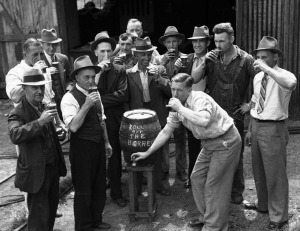Exercise and Alzheimer’s – Part 2
 I’m going to talk about the brain via an organ I know a little bit better: the prostate.
I’m going to talk about the brain via an organ I know a little bit better: the prostate.
Bear with me.
Scientists have long known that, at autopsy, many men are found to have prostate cancer that never spread, never caused a problem, and never needed to be treated. They died with it, not of it. Why that is, is the subject of future posts, but trust me on this. Sometimes, diseases only show up at autopsy. People live a good long life and never show any signs of trouble, and yet, when they die, there it is under the microscope. For whatever reason, the disease never got out of hand. People died with it, not of it.
I did not know, until I interviewed Richard O’Brien, M.D., Ph.D., for an article for Breakthrough, http://www.hopkinsmedicine.org/innovative/research/newsletter.html a publication of the Johns Hopkins Center for Innovative Medicine, that the same thing happens with Alzheimer’s. O’Brien, who was Chairman of Neurology at Johns Hopkins Bayview Medical Center, now Chairman of the Department of Neurology at Duke University School of Medicine, told me that some people, at autopsy, have Alzheimer’s pathology. They have the telltale brain plaques and protein tangles seen in Alzheimer’s disease – but they never develop any cognitive impairment. Other people have the exact same pathology, and they die of heartbreaking dementia. Why is this?
O’Brien sees opposing forces at work in the brains of people as they age. Think of the good Anakin Skywalker, still a part of the bad Darth Vader: a light-saber fight, now tilting toward the good side, now toward the dark side. Eventually, the good tips the balance, and Darth Vader dies on the good side, after having done a very helpful deed.
Well, in Alzheimer’s, the tipping point – the game-changer, the key factor that weights the scales toward dementia – seems to be ischemic disease. Stroke, or mini-stroke. “With a given amount of Alzheimer’s disease pathology in the brain,” O’Brien told me, “there are two forces at work. One is driving you to become demented, and the other is protecting you from being demented. The biggest force that we’ve found thus far is cerebrovascular disease.”
Note: This does not mean that every man who has had a stroke or who has cerebrovascular disease is going to get Alzheimer’s. That’s not what he’s saying at all. What it does suggest is that if a man has significant atherosclerosis, or if he has had a stroke, even if it’s asymptomatic – AND he has the plaques and tangles, that is a very powerful predictor that he will develop dementia.
The body has a limited capacity for what scientists call “insults.” Stroke is an insult. Plaques are an insult. Think of a boxer who can take a lot of punches, but he can only withstand so much. The brain has a tipping point, too. O’Brien believes that “either one of these alone isn’t enough, but the two existing together in the same brain are enough to tip you over.”
But there is very good news here:
Doctors are getting better at spotting and treating the risk factors that lead to stroke. In fact, two studies published last year found that the incidence of dementia has declined over the last 30 years. “The primary reason for that is the treatment of coexisting cardiovascular risk factors,” O’Brien said. He cautions that none of these treatments prevents the Alzheimer’s pathology from building up – but they “prevent it from becoming manifest. So you die with your plaques and tangles, but you’re still cognitively intact.”
So, what can you do to protect your brain? A huge one is exercise. The choices that we make today can help influence our risk of dementia later. In a report published in the Annals of Internal Medicine, scientists followed up on about 20,000 people who took part in treadmill testing in the 1960s as part of a cardiovascular study. Today, these people are in their eighties, nineties, or are deceased. “By searching the Medicare records for dementia diagnoses,” said O’Brien, the scientists “found that the people who had been in the fittest 30 percent of that group had a dementia rate that was half that of the other people in the cohort,” which confirms that “one of the side effects of regular exercise is a significant reduction in your risk of dementia.”
Another huge factor is cognitive reserve, and this is from education. It turns out that people who go to college tend to have more cognitive reserve than people who don’t. Note: I would imagine, although it hasn’t yet been proven, that if you haven’t been to college but you read and learn a lot, you are building up a cognitive reserve, as well. Learning a language or playing a musical instrument, doing research for your work, or singing in a choir – basically, anything that challenges your brain, as opposed to sitting on the couch and staring passively at the TV – all of these things have been shown to have beneficial effects on your ability to think, on the brain’s ability to make neural connections inside itself.
“All things being equal, people who go to college are much less likely to get demented,” O’Brien says, “people who are very fit are much less likely to get demented.” And there’s a third thing – “People with certain types of personality traits are less likely to get demented. Our latest data suggest that obesity is playing a similar role, too.” We already know (see my previous post on Low T) that fat, especially belly fat, changes your levels of hormones. What else does it do? Scientists are still figuring that out, but chances are good that obesity is not of great benefit to the brain.
Personality traits?
People who are positive and upbeat seem to have some protection from dementia. Again, why this is, is uncertain. It may be that people who are positive are more likely to educate themselves and exercise. They may also be more likely to do crossword puzzles or sign onto Luminosity, although O’Brien said he doesn’t think doing a puzzle here or there is enough by itself. One study published in the New England Journal of Medicine showed that people who did crossword puzzles had a lower rate of dementia than did people who spent a lot of time watching TV. But, O’Brien noted, this might be because the brains of people who choose to do crossword puzzles are very different from those of people who like to watch TV. “If you forced the people who are watching TV all the time to do crossword puzzles, would they have a lower incidence of dementia? I doubt it.”
Cognitive reserve is a very robust thing, according to O’Brien. “If you look at the neurons of people with high levels of cognitive reserve, they’re pretty resistant to the toxic effects of Alzheimer’s disease pathology. They actually have bigger neurons in the key areas of the brain. Their neurons are more healthy, even though there’s a lot of Alzheimer’s disease pathology.”
And finally, there is diet. O’Brien suspects that the Mediterranean diet might also have a significant effect on dementia, because it also has significant effects on cardiovascular health. “The data’s pretty clear that if you can prevent cerebrovascular disease, your chances of becoming demented are much lower.”
In addition to the book, I have written about prostate cancer on the Prostate Cancer Foundation’s website, pcf.org. The stories I’ve written are under the categories, “Understanding Prostate Cancer,” and “For Patients.” I firmly believe that knowledge is power. Saving your life may start with you going to the doctor and knowing the right questions to ask. I hope all men will put prostate cancer on their radar. Get a baseline PSA blood test in your early 40s, and if you are of African descent, or if cancer and/or prostate cancer runs in your family, you need to be screened regularly for the disease. Many doctors don’t do this, so it’s up to you to ask for it.
©Janet Farrar Worthington




Leave a Reply
Want to join the discussion?Feel free to contribute!